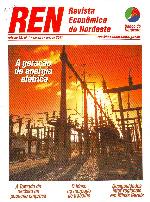A CHESF E O PAPEL DO ESTADO NA GERAÇÃO DE ENERGIA ELÉTRICA
DOI:
https://doi.org/10.61673/ren.2001.1854Keywords:
Northeast Brazil, Energy Sector, Institutional Analysis, Power generation, Energy distribution, Hydroelectric plants, Eletrobrás CompanyAbstract
It analyses the institutional, political and organizational impacts resulting from CHESF’S operating style, considering the most relevant events in different moments of its existence as a development agent. The method used is the descriptive and qualitative research. The political and institutional analysis focus on the role of the state, its choices strategies and bureaucratic insulation. On a second level of analysis, it studies the performance of managers and technical groups in the institution. It concludes that CHESF stimulated the creation of dynamic poles directed to the Northeast economic expansion, thanks to the efficient use of its hydroelectric potential which benefited urban and industrial areas rather than those not reached by the great transformations resulting from its enterprising style. The analysis of its management style shows bureaucratic stability, organizational effectiveness as well as political and institutional articulation and, engaged action of leaders and technical groups.








